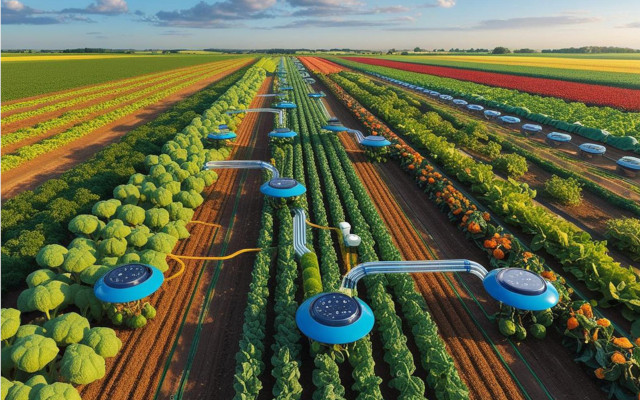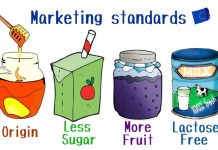The ‘Vision for Agriculture in the EU: Shaping together an attractive farming and agri-food sector for future generations’ was presented today, February 19, 2025, by the European Commission. (1) A brief analysis to follow.
1) EU’s vision for the future of agriculture and food: introduction
‘Farming and food are strategic sectors for the Union, providing safe, high-quality food to 450 million Europeans and playing key role in global food security. (…) European food security and food sovereignty are non-negotiable. European citizens confirm this: 94% of citizens who took part in the latest Eurobarometer survey confirm that it is important to secure a stable supply of food in the EU at all times.
Food is also part of our economic competitiveness. The agri-food sector, in its diversity of enterprises, scope, scale and production methods, generated an added value of more than 900 billion euro in 2023, providing employment to almost 30 million people (15% of EU employment). As the largest agri-food exporter in the world, the EU has been steadily increasing its trade surplus over the years, reaching EUR 70 billion in 2023’. (1)
2) Building trust and dialogue
‘The existing mechanisms to foster dialogue and cooperation with stakeholders at EU level, such as the current Civil Dialogue Groups, will need to be reviewed to guarantee more meaningful and effective participation in the design of future policies.
The new European Board on Agriculture and Food will be supporting the Commission in creating inclusive policies by providing strategic advice and fostering a new culture of dialogue among the different players in the agri-food chain.
Additionally, the EU CAP Network will continue to facilitate exchanges across all relevant actors and Annual Youth Policy Dialogues will empower the meaningful inclusion of young citizens and farmers in policy discussions’. (1)
3) Equitable distribution in the agri-food value chain
Finally, the European Commission declares the importance of a more balanced allocation of revenues, risks, and costs within the agri-food value chain. And the need to ensure that farmers receive fair compensation to invest in resilient and forward-looking farms. Unfair trading practices, such as selling below production costs, ought to be tackled through enhanced regulations and enforcement mechanisms.
Farmers often face disproportionate risks and expenses, leading to financial instability. Addressing these disparities is crucial for the long-term sustainability of farming and food security. ‘Practices where farmers are systematically forced to sell below costs will not be tolerated’. Proposed measures include:
- strengthening farmers’ bargaining power in contract negotiations;
- revising the Unfair Trading Practices Directive (EU) 2019/633 (UTPs) to prevent below-cost selling;
- improving transparency via the Agrifood Chain Observatory (AFCO), which will publish price formation indicators to inform policy decisions.
4) More targeted public support
The Common Agricultural Policy (CAP) will continue to be a central pillar of public support, but future payments will be more focused and streamlined. Assistance will prioritize farmers who are actively engaged in food production, thus contributing to food security, environmental conservation, and economic vitality, with an emphasis on small and medium-sized farms, young farmers (now less than 12%), and those in areas with natural constraints.
The current CAP has been criticized for inequities and opacity in payment distribution. A more targeted approach should ensure that support reaches those who need it most while promoting sustainability and resilience. Envisaged measures include:
- simplifying income support tools and reducing administrative burdens;
- extending degressivity and capping measures to ensure a fairer distribution of payments;
- streamlining payments for ecosystem services and investment support.
4.1) The future CAP
‘The future CAP for post-2027 will rely on basic policy objectives and targeted policy requirements, while giving Member States further responsibility and accountability on how they meet these objectives.
Flexibility will be extended to farmers, giving them further agency in designing farming practices that are more tailored to their farms and context. The current system of conditionality will be simplified’.
The eco-schemes, which reward farmers to deliver ecosystem services that go beyond mandatory requirements, will be oriented away from conditions to incentives.
5) Harnessing innovation and diversification
The Commission recognizes the potential of innovation to transform agriculture, particularly through bioeconomy, circularity, and renewable energy. Farmers are encouraged to adopt nature-positive practices, such as carbon farming and agroecology, which offer new income streams and environmental benefits. Innovation is essential to addressing climate change, reducing input costs, and creating new economic opportunities for farmers.
‘The new Bioeconomy Strategy, to be presented by the end of 2025, will aim at positioning the European Union as a global leader in the rapidly expanding bioeconomy market. We must accelerate the commercialization of bio-based and circular biotechnologies, capture emerging market opportunities and bridge investment gaps. This will be particularly beneficial for the farming community by enabling diversification of value streams, valorisation of farm residues, strengthening the role of primary producers in the value chain and generating new jobs in the rural areas‘.
Diversification of income sources enhances resilience and sustainability. Key actions include:
- accelerating the commercialization of bio-based and circular solutions;
- developing certification frameworks for carbon farming and nature credits; (2)
- promoting renewable energy production, such as solar panels, windmills, and biogas, to enhance energy security and provide additional income.
6) Digitalization and agri-tech
Digital tools and agri-tech innovations are set to revolutionize farming by reducing costs, optimizing inputs, and expanding market access. Precision farming, e-commerce platforms, and data-based solutions will play a crucial role in increasing profitability and sustainability. High input costs and extreme weather events necessitate innovative solutions to maintain productivity and profitability.
Digitalization offers a pathway to more efficient and resilient farming practices. Recommended actions include:
- supporting the adoption of precision farming technologies;
- expanding e-commerce platforms and digital marketing tools for farmers;
- leveraging the 100 Living Labs under the ‘Soil Deal for Europe’ mission to address challenges like fertilizer costs and water scarcity.
7) Protecting and strengthening the agri-food sector
The EU aims to protect the agri-food sector through international trade measures, such as WTO agreements, and by enhancing competitiveness through simplified regulations and extended country-of-origin labeling. Global market volatility and geopolitical tensions require robust measures to safeguard the agri-food sector and ensure its competitiveness, according to the Commission, such as:
- providing export credits and de-risking mechanisms through collaboration with the European Investment Bank (EIB); (3)
- simplifying regulations to improve the competitiveness of European farmers;
- extending country-of-origin labeling to enhance transparency and consumer trust.
8) Preparedness and risk-proofing the agri-food sector
The EU’s vision emphasizes the need for a comprehensive risk and crisis management approach to address challenges such as climate change, pandemics, and geopolitical instability. This includes incentivizing long-term farm adaptation, improving insurance mechanisms, and ensuring policy coherence. Farmers are on the frontlines of multiple crises, from extreme weather events to market disruptions.
A robust risk management framework is essential to help them adapt and thrive in an uncertain future. This framework should include:
- reinforcing incentives for farmers to reduce risk exposure through long-term adaptation strategies;
- enhancing cooperation with the EIB, insurance companies, and value-chain actors to improve the availability and affordability of agricultural insurance; (4)
- supporting the development of climate-resilient crops and local strategies through research and innovation, including new genomic techniques;
- ensuring policy coherence and flexibility in crisis management tools to respond effectively to emerging challenges.
9) A new generation renewal strategy
The future of Europe’s food sovereignty by 2040 depends on empowering young and new farmers. Key barriers to generational renewal in agriculture, such as access to land, investments, and skills, must be addressed. The ‘right to stay’ concept supports young farmers in establishing themselves locally. However, achieving generational renewal requires a comprehensive, society-wide approach and policy mix, extending beyond the Common Agricultural Policy (CAP).
A Generational Renewal Strategy will be developed in 2025 by the European Commission, in collaboration with Member States, the European Parliament, and stakeholders, to offer policy recommendations at EU and national/regional levels. Challenges like limited fertile land, climate change, and land use competition necessitate improved land mobility, transfer conditions, and transparency in land planning and transactions. Member States can leverage tools like retirement schemes and tax incentives to support renewal.
Additionally, the Commission will establish an EU Observatory on Farmland to enhance transparency in land transactions, price trends, and land use changes, aiding informed decision-making and regulatory efforts. This initiative aligns with the European Parliament’s request and aims to balance agricultural policy interests with single market freedoms.
10) Preliminary conclusions
The vision for the future of agriculture and food in the EU, at a first glance, seems to represent a bold and necessary step toward fairness, sustainability, and resilience. By addressing social, economic and environmental challenges, the proposed measures aim to create a food system that benefits both people and the planet. However, their success will depend on effective implementation, stakeholders’ involvement, and ongoing adaptation to emerging challenges.
Dario Dongo
References
(1) European Commission’s Communication. A Vision for Agriculture and Food Shaping together an attractive farming and agri-food sector for future generations. COM(2025) 75 final. 19 February 2025 https://tinyurl.com/jypvcdw4
(2) Carbon Farming Regulation (EU) 2024/3012, CRCF. ‘Going forward, the Commission will complement this with developing opportunities for nature credits, units of nature-positive actions, representing quantified and certified high-quality nature-positive outcomes’
(3) ‘The farm sector is confronted with a significant financing gap estimated at EUR 62 billion (for 2022), much higher than in 2017’
(4) ‘The Commission will work to efficiently use public funding and investment and leverage and de-risk private capital, working closely with institutional investors such as the European Investment Bank Group (EIBG) as well as the banking sector.
In this respect, the Commission will explore options to establish risk insurances schemes for primary producers and also explore public-private partnerships to attract investments for SMEs in agriculture and food business to step-up the agri-food chain transformation’
Dario Dongo, lawyer and journalist, PhD in international food law, founder of WIISE (FARE - GIFT - Food Times) and Égalité.








